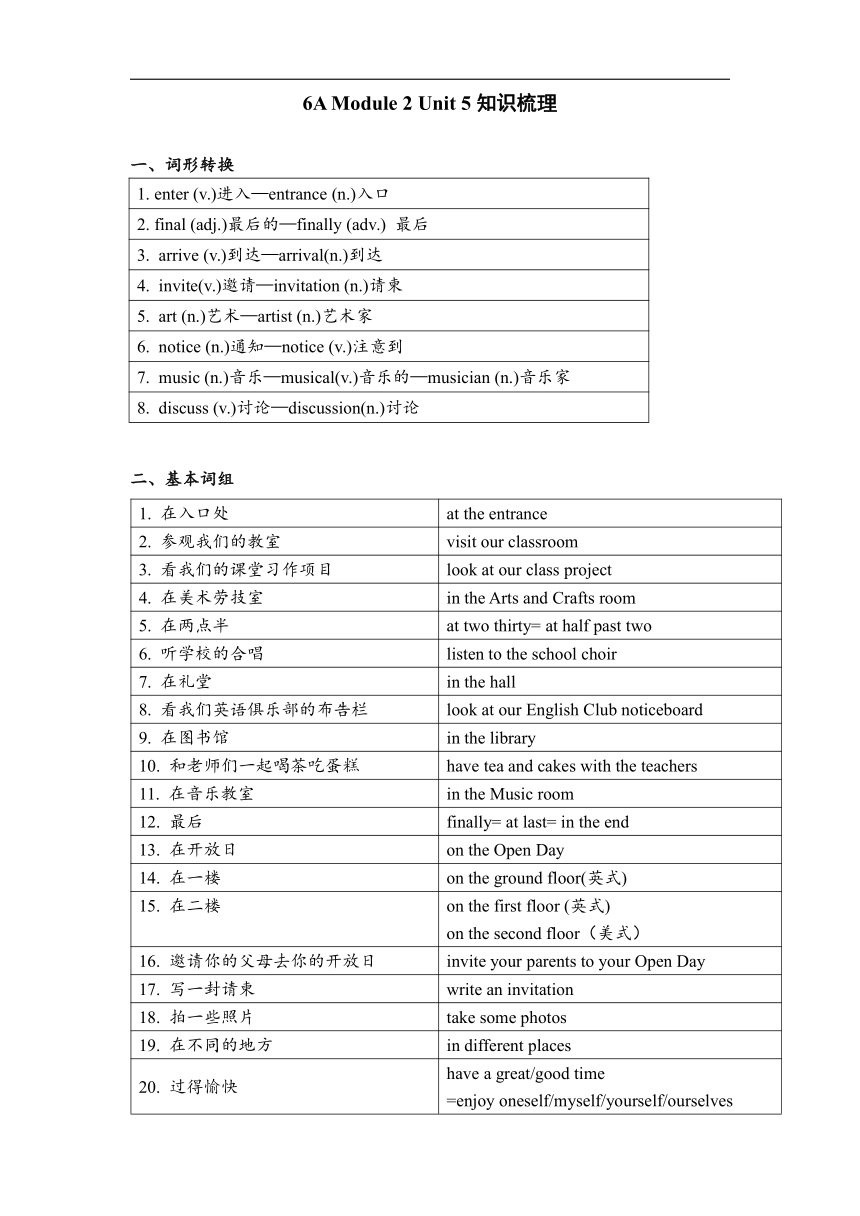
6A Module 2 Unit 5知识梳理 一、词形转换 1. enter (v.)进入—entrance (n.)入口 2. final (adj.)最后的—finally (adv.) 最后 arrive (v.)到达—arrival(n.)到达 invite(v.)邀请—invitation (n.)请柬 art (n.)艺术—artist (n.)艺术家 notice (n.)通知—notice (v.)注意到 music (n.)音乐—musical(v.)音乐的—musician (n.)音乐家 discuss (v.)讨论—discussion(n.)讨论 二、基本词组 1. 在入口处 at the entrance 参观我们的教室 visit our classroom 看我们的课堂习作项目 look at our class project 在美术劳技室 in the Arts and Crafts room 在两点半 at two thirty= at half past two 听学校的合唱 listen to the school choir 在礼堂 in the hall 看我们英语俱乐部的布告栏 look at our English Club noticeboard 在图书馆 in the library 和老师们一起喝茶吃蛋糕 have tea and cakes with the teachers 在音乐教室 in the Music room 最后 finally= at last= in the end 在开放日 on the Open Day 在一楼 on the ground floor(英式) 在二楼 on the first floor (英式)on the second floor(美式) 邀请你的父母去你的开放日 invite your parents to your Open Day 写一封请柬 write an invitation 拍一些照片 take some photos 在不同的地方 in different places 过得愉快 have a great/good time=enjoy oneself/myself/yourself/ourselves 三、拓展词组: 1. 写一篇文章 write an article 张贴布告栏 put on the noticeboard 给我的朋友写一封请柬 write an invitation to my parents 四、重点句型 1. --他们首先/接下来/然后/之后/最后做什么 --首先/接下来/然后/之后/最后他们将参观我们班级。 -- What will they do first/next/then/after that/finally --First/Next/Then/After that/Finally, they’ll visit our classroom. 我将在入口处接他们。 I’ll meet them at the entrance. --他将在哪里? --他将在大厅。 -- Where will he be --He will be in the hall. --它在哪里? --它在一楼。 -- Where is it --It’s on the ground floor. 五、重点语法 1. 一般将来时(simple future tense) 1)构成:will+动词原形; be going to+动词原形2)一般将来时的肯定式、否定式和疑问式,如下:例: I will go to see a film. I am going to see a film. 我将看一场电影 I will not (=won’t) go to see a film. I am not going to see a film. 我将不去看电影。 Will you go to see a film Are you going to see a film 你打算去看电影吗?3)常和tomorrow,next week等词连用。例: There will be a football match tomorrow. There is going to be a football match tomorrow.明天将有一场足球赛。 2. 一般过去时(simple past tense)1)一般过去时的构成: 主语+ 动词过去式(规则:v. +ed)2)一般将来时的肯定式、否定式和疑问式,如下:例: I worked. I did not work. Did you work 3)动词的过去式变化如下: 1、一般情况下,动词词尾加 -ed , 例:work—worked play—played want—wanted act—acted 2、以不发音的 -e 结尾动词,动词词尾加 -d, 例:live—lived move—moved taste—tasted hope—hoped 3、以辅音字母 + y结尾的动词,把-y变为-i 再加-ed, 例:study—studied copy—copied cry—cried carry—carried 4、以一个辅音字母结尾的重读闭音节动词,双写词尾辅音字母,再加 -ed, 例如:stop —stopped 5、不规则动词的过去式变化规律性不强,须多加记忆。 4)常和表示过去的时间状语连用,如:yesterday,last week, a moment ago, in 1990等。例:The plane took off a moment ago. 飞机片 ... ...
~~ 您好,已阅读到文档的结尾了 ~~

